TCN Meets Celebrated Split Rower and Olympic Bronze Medalist Igor Boraska
March 6, 2020 - TCN meets Olympic bronze medalist and the first Croatian athlete to compete in both the Summer and Winter Olympic Games - Split rower Igor Boraska.
“You know, rowing wasn’t my first sports choice,” Igor said as he sipped tea on the Riva one windy winter afternoon.
“There were a couple of sports I played before I started rowing, among them being football for five years, table tennis, basketball, judo, track & field. After I was done experimenting, when I was 15, I didn’t know what I should do. My uncle, my father’s brother,who was a national champion in rowing in the 1970s for Gusar Split, said, ‘why don’t you come down to our club and give it a try?’
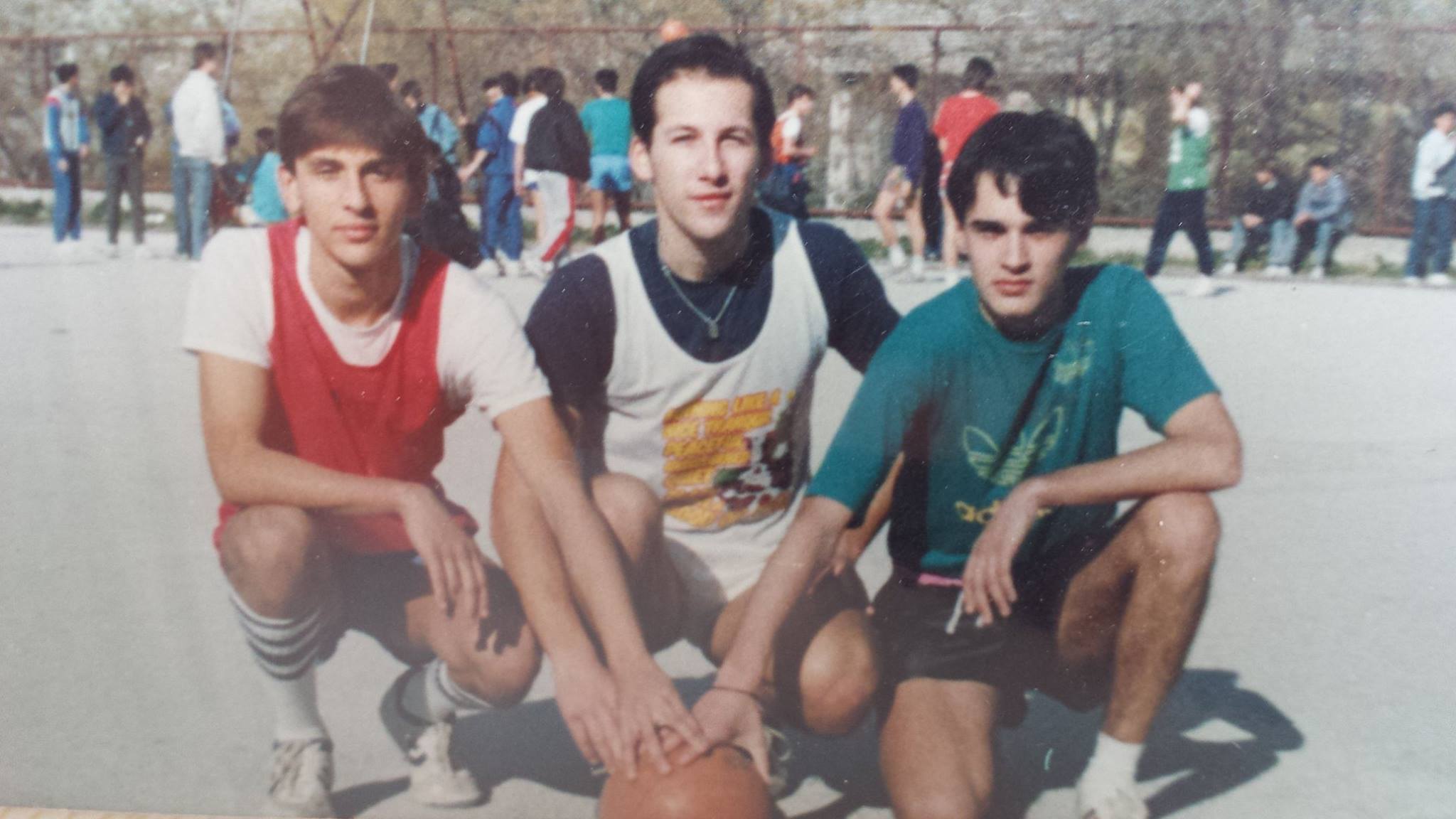
That was in 1985, and I was just finishing my elementary school and starting high school. I went to Gusar and I met a couple of guys that I already knew from the neighborhood, and actually, there were about 7-8 of them, so we could even fill the whole eight boat, just from the Split 3 suburb. I really liked the sport because you feel connected with nature and get to row along Marjan, Trogir, Vranjic… And it didn’t take long for the results to start coming.”
Igor spoke about the success he experienced early on in his career for Yugoslavia.
“After the second year of rowing, we changed coach. He was the coach only these two years when we were juniors, which is a very sensitive time for rowers - around 16 years old. He coached us for two years and we went on to become Croatian and Yugoslav champions and made the national team. Unfortunately, he left Split for Zagreb in 1989, and I had to go to the army after high school. I came back in 1990 and started rowing with the same guys, the same partner, Tihomir Frankovic. Immediately, in the first year, again as seniors, we were among the top three pairs in Yugoslavia, which was a remarkable result, because you had outstanding teams from Slovenia, Serbia and Croatia.
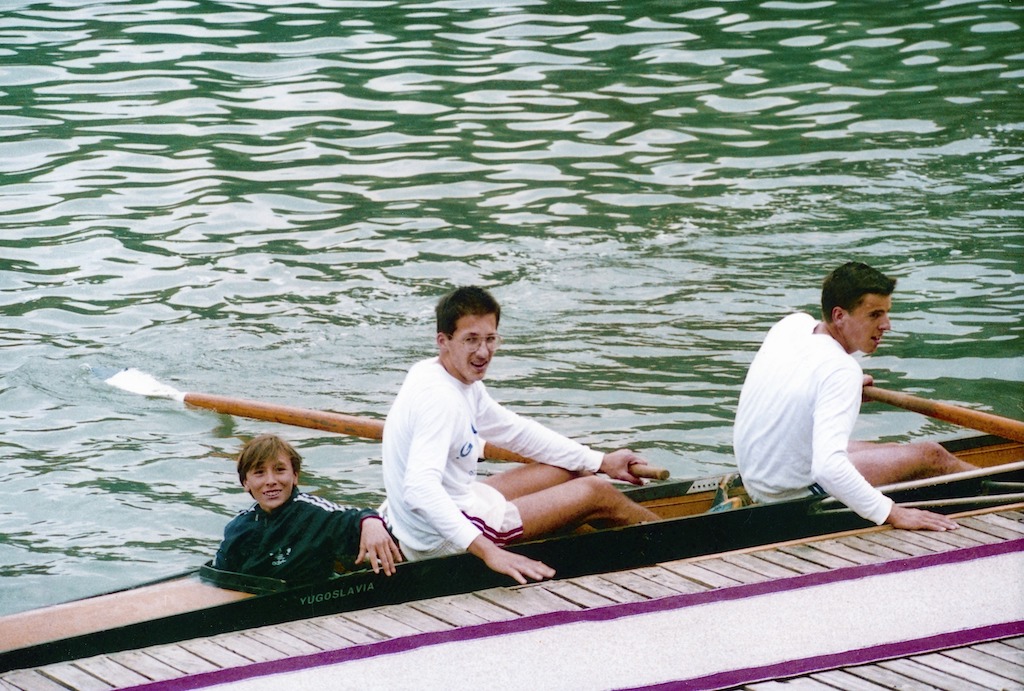
Then, in the spring of 1991, just before the war, we were competing for Yugoslavia in the coxed eight and were supposed to go to the World Championships that September in Vienna. In that eight team, there were seven Croatians and one Slovenian. All these guys were born in 1970/1971, so we were all almost the same year, and really good friends. Our final training camp for the World Championships was in Bled, Slovenia in August that year. I think it was the middle of August when they told us that Croatians would no longer participate in any Championship under the Yugoslav flag. On the other hand, in September 1991, the Slovenians still competed for the Yugoslav national team.
His career then took him to Providence, Rhode Island.
“I had already made contact with a few coaches in the USA, and really just wanted to go there and study, but it was a plus that they had great rowing programs. Many of the best academic universities are also the best for rowing. For example, Ivy League schools like Harvard, Yale, Princeton, and Brown. In the end, I chose Brown, because the coach, Steve Gladston, was really great to me from the first time we met at the airport in Providence. He took great care of me, showed me all the facilities, told me all about the future and that he intended to recruit a few more European rowers. Among them was a rower from Switzerland who later became an Olympic champion in the single scull, Xeno Müller, and a couple of other guys from the US national team. I knew that we were going to have a powerful team, and that we would be winning US national championships.
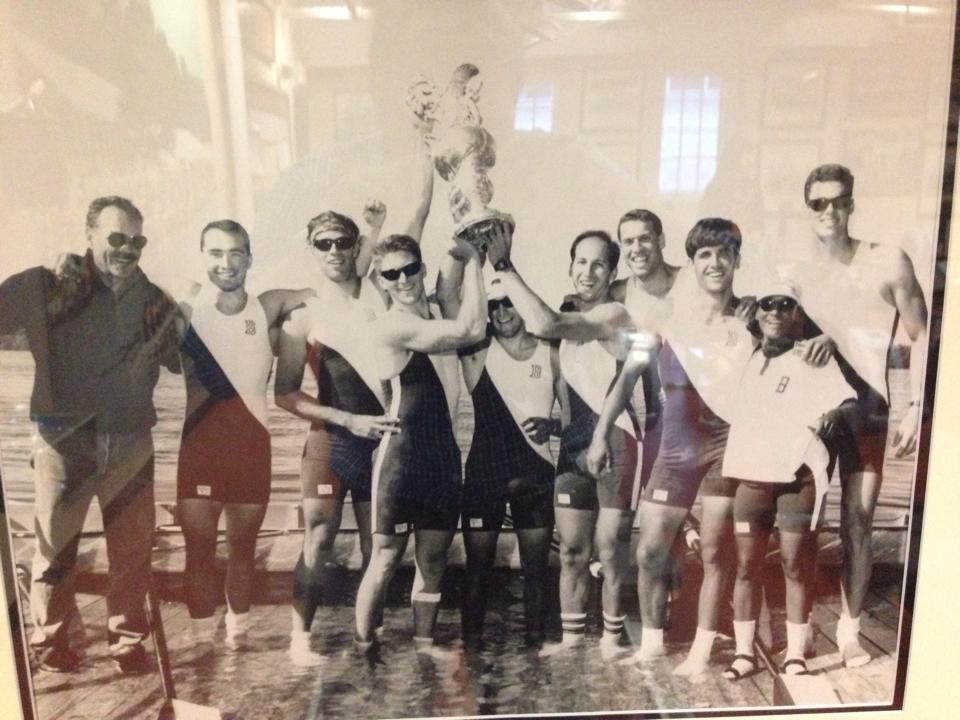
Apart from that, Brown was also a fantastic school, one of the best Ivy League schools, and they say it is the most liberal Ivy League school. They also had an open curriculum, which I really liked. Although I was an engineer and good at math and physics, I also liked some other things, like geography, history and economics, and I was able to take classes from those subjects as well. So I majored in two fields - I have a Bachelors's Degree in mechanical engineering and economics, too."
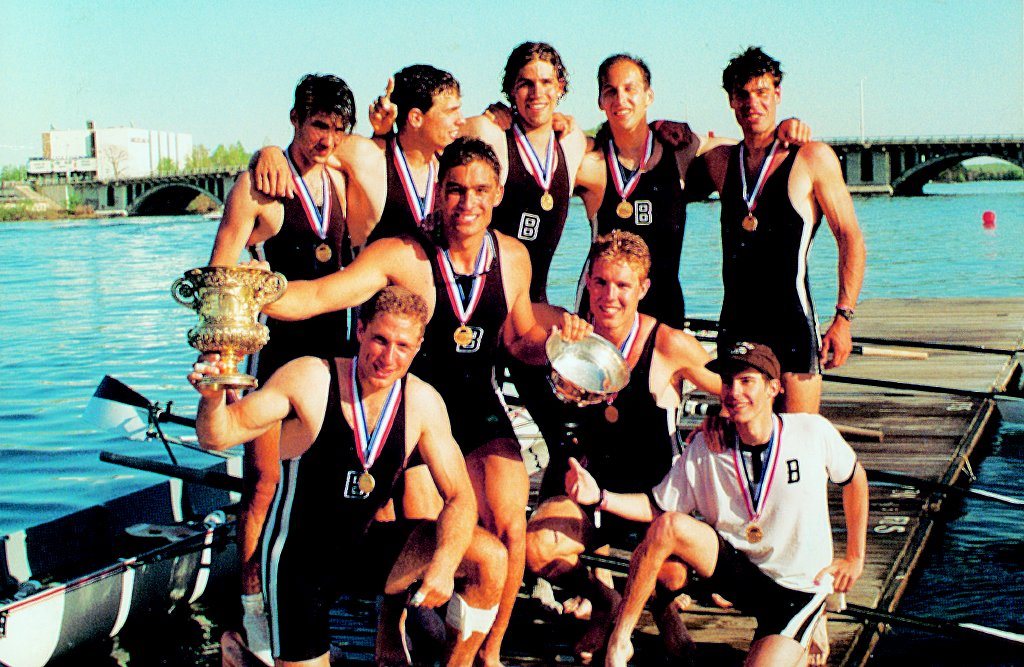
Igor was in the United States during most of the Homeland War.
“I was in Croatia during all summer and winter breaks, as I would come back and train and race with the guys here and at the international regattas in Europe. I have spent about 4 months a year from 1992 to 1995 in Croatia, when we were still at war, and in 1994, we went on to win the World Championships in the coxed pair with Tihomir Frankovic and Milan Razov."
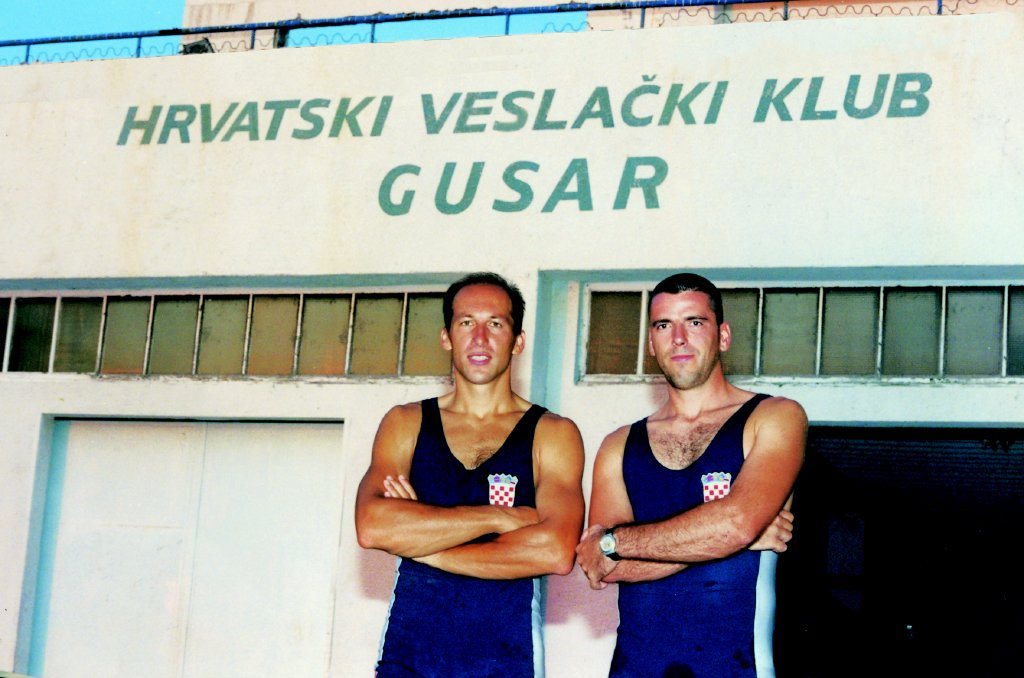
Boraska also held a 20-year-record for the best time in a coxed pair event set at 1994 World rowing championship.
“In 1994, we won the first gold medal for Croatia in any Olympic sport. In 1993, we finished 5th, and in 1992, unfortunately, we missed the Olympic Games because of political reasons, and some people from our rowing federation weren’t happy that the Gusar team would be there as a representative in coxed pairs. We were young, only 21, but we had a really good chance in 1992, and while we probably wouldn’t win a medal, we could finish in the top five or six pairs, had we been able to compete in the ’92 Olympic Games.
In December of 1994, I finished my studies and came back in 1995 to compete and start working in Croatia. I didn’t believe that I would be rowing more than another year, and only set my sights on the Atlanta Olympics Games in July 1996. ‘I will just do this Olympic Games and then get a real job’, I said. That didn’t happen.”
The Atlanta Olympic Games didn’t quite go as expected…
“We were really unlucky at the Atlanta Olympic Games and finished seventh in the end, although we were favorites to win one of the medals. It’s a long story, and I should probably give you my book, haha.
Anyway, we had four guys from Split - Frankovic, myself, Sinisa Skelin and Sead Marusic. Two months before the Olympics, we qualified in the coxed four and went on to Lucerne, which is the best regatta, and finished third there - even though we were in the lead for most of the race. We also had to race the other Croatian four to qualify for the Atlanta.
We were then favorites to win one of the first three places in Atlanta. However, one month before the Games, we went to acclimatize because of the high humidity and heat. We went to the Mississippi area and trained on the Tupelo, the birthplace of Elvis Presley. We were actually staying in Tupelo and training in one of the channels on the Mississippi River, at 6 am and 6 pm because of the heat. We spent three weeks there, and two days before we were off to Atlanta to the Olympic Games, there was a huge storm, and lightning struck a tree, which fell on our boat. Our boat fell apart.
This was in 1996, and there were no alternatives like there are today. In the USA, they didn’t have this type of boat. We used an Empacher type boat, which is German made. We called up a guy who said he was sorry and that he was already in Atlanta and didn’t have any spare boats. Though he had one spare boat for the German women’s team, but that is a much different and made for the average weight of 70-75 kilos. Our average weight was 95. That was the only boat we could borrow, so we did. When we sat down, the boat really felt low and just completely different. To compete in the Olympic Games with a completely new boat… that wasn’t ideal for us. Plus, we had a lot of heat, and in the end, we didn’t even make the top six to go in the final. We were first in the B final, and seventh overall.
The three teams from our semi-final went on to win gold, silver and bronze. We were fourth in our semi.”
The Atlanta mishap was only a minor obstacle to what Igor went on to achieve.
“1996 was definitely a disappointment and I just wanted to do one more Olympic cycle after that. In that Olympic cycle, between 1996 and 2000, we had great results. In 1997, we were the best pair again in Croatia and went on to win the silver at the Mediterranean Games in 1998, and won the silver medal at the world championships in coxed four.
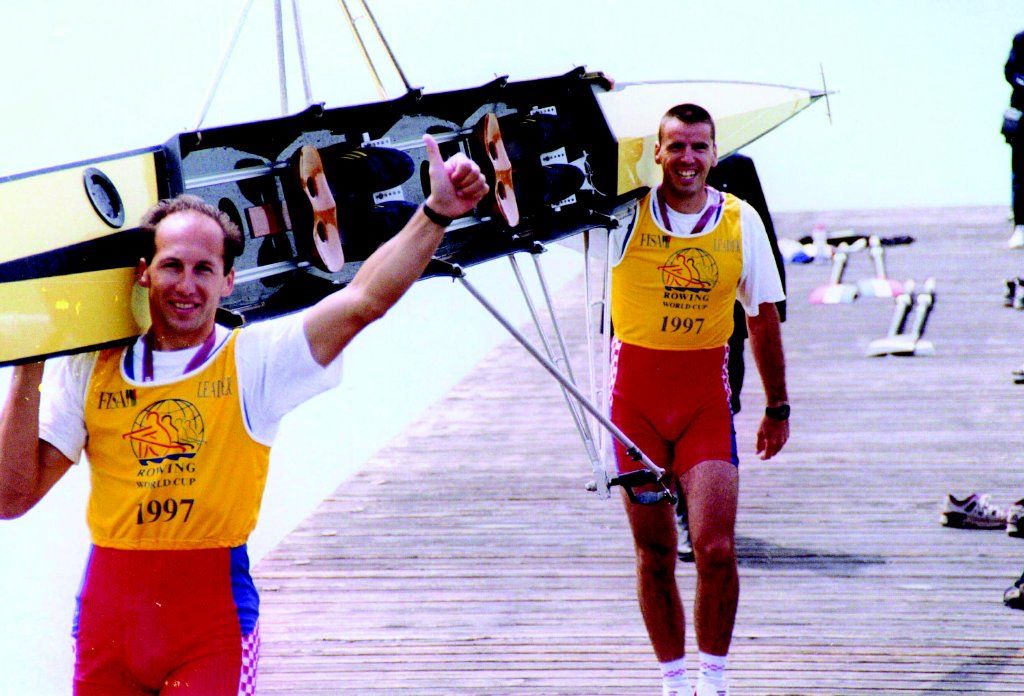
In 1999, however, we were performing so poorly; we didn’t know what was going on and were frustrated. Plus, the city and the club didn’t really give us any financial support. The club was in such a desperate situation that we were not able to get electricity and warm water. It was a really bad year, and I was nearly on the very of quitting.
We didn’t qualify in 1999 and had only one more chance in Lucerne in 2000 to qualify for Sydney. Then, in 2000, I said, ‘okay, I am just going to do these six more months and that’s it.’ That year, a couple of younger rowers emerged as a really good force in Croatian rowing, like the Skelin brothers and a couple of other guys from Zagreb and Zadar. There were exactly 8 of us very close to each other racing in pairs. We could see that we could have an excellent team and a bigger team, maybe not a four, but even an eight. It was a suggestion from our coach, Igor Culin, to try and row the first international regatta of the season in the eight, against the Italians in the Piediluco regatta near Rome. We went there and killed them - we beat them by more than 10 seconds. That was a good sign that we were on the right track.
The first World Cup regatta was held in Munich in May, and we knew all the top teams would be there - Great Britain, Germany Romania, USA. We decided to go and said that if we could make it in the top five or six, we will stay in the eight and try to qualify in the qualification regatta in June. We went to Munich and won. It was the first regatta as a Croatian eight. I rode in the eight at Brown for many years, but with the national team, that was the first time as we usually concentrate on smaller boats like pairs and fours.
Even back for Atlanta, we could form the eight, but everybody thought that the eight requires being together in one camp, training more and spending more time together. However, here, in 2000, we proved it all wrong. After only a few weeks of training together, we were able to beat everyone in the world. At that point, we knew we were good and would go to the Olympic qualification regatta in Lucerne. There were only two spots for the Olympics, and it was us and Canada to go."
Igor won the bronze medal in Sydney with Branimir Vujevic, Niksa Skelin, Sinisa Skelin, Kresimir Culjak, Tomislav Smoljanovic, Tihomir Frankovic, Igor Francetic and Silvijo Petrisko.
“In Sydney, we were also one of the favorites, even though the US, Great Britain, and Australia all thought they would win. Most of the final race we spent in second place behind Great Britain and, in the end, Australia sprinted past us and we kind of lost power in the last 200 meters. But we won the bronze medal in Sydney, behind GB in first and Australia in second. And the world champions USA, who were almost undefeated for three years, came in fifth.
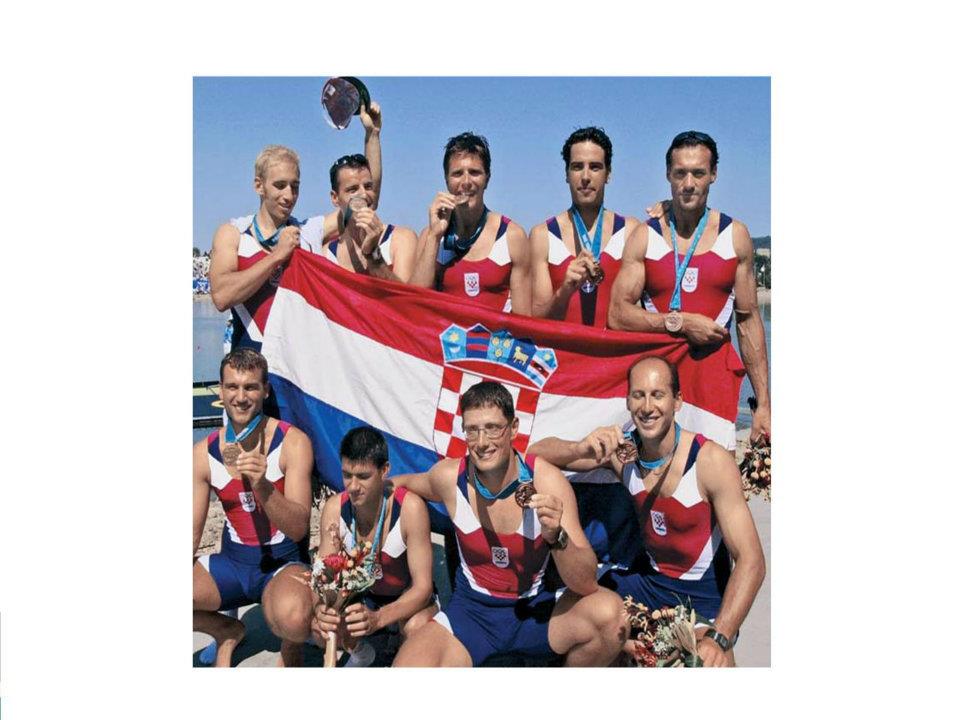
There were couple of my friends from Brown on their team and they couldn’t believe that they got beaten by Croatians, haha.”
Was that the highlight of his career?
“Definitely, especially because it was won in the event where ‘only the big countries can win’. Croatia was not supposed to be winning anything in the eight. The bronze medal, plus the first medal for Croatia ever in 1994, when we won the gold at the world championships, I like the same.
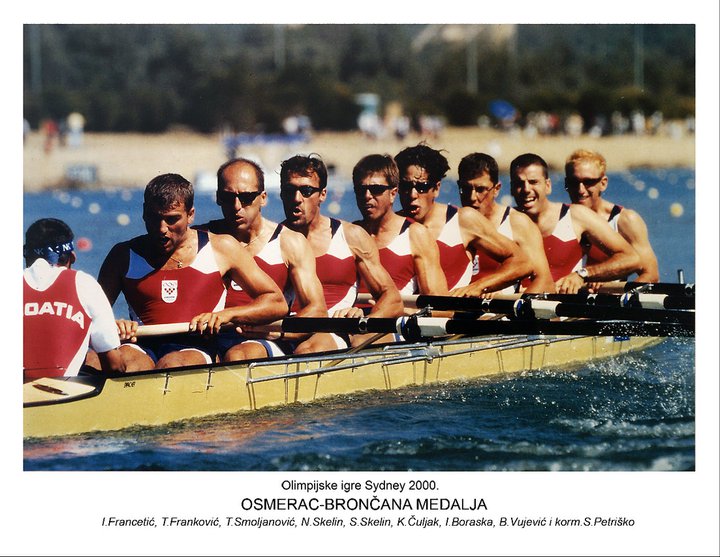
After that Olympics I didn’t stop rowing - I kept going for the next Olympic Games in Athens. The eight team stayed together for one more year and won a silver medal at the World Championships in 2001.”
Igor was the first Croatian to compete at both the Summer and Winter Olympics.
"After we won the silver medal, I immediately jumped into training for the bobsled - which is a completely different kind of training. It required more weights, more running.
I first took lessons back in 2000 and got the license but stopped because I went back to rowing in the eight. I joined the team again after 2001; at that point it was already World Cup season, where we had to get a certain number of points to qualify for the Olympic Games.
It all kind of happened because a good friend of mine, Ivan Sola, was a pilot, and also the Yugoslav champion in motorcycle racing. He told me some stories and I saw the movie Cool Runnings a couple of times, and it was just a new challenge and I figured I’d see what a bobsled felt like. We didn’t think about the Olympic Games; we thought we would just have some fun. After a few months, I said, ‘Ivan, we are doing this just for fun but I think we can do more.’ So I asked him what he thought we needed to qualify for the Olympic Games, to which he answered that we needed a few more guys who were really good and fast, potentially from the local track & field team. It turns out that all the guys were from Split. We had 7-8 guys on the team. At first, we didn’t use a four-man bobsled and used only a two-man bobsled. Ivan was always the pilot, and then we alternated.
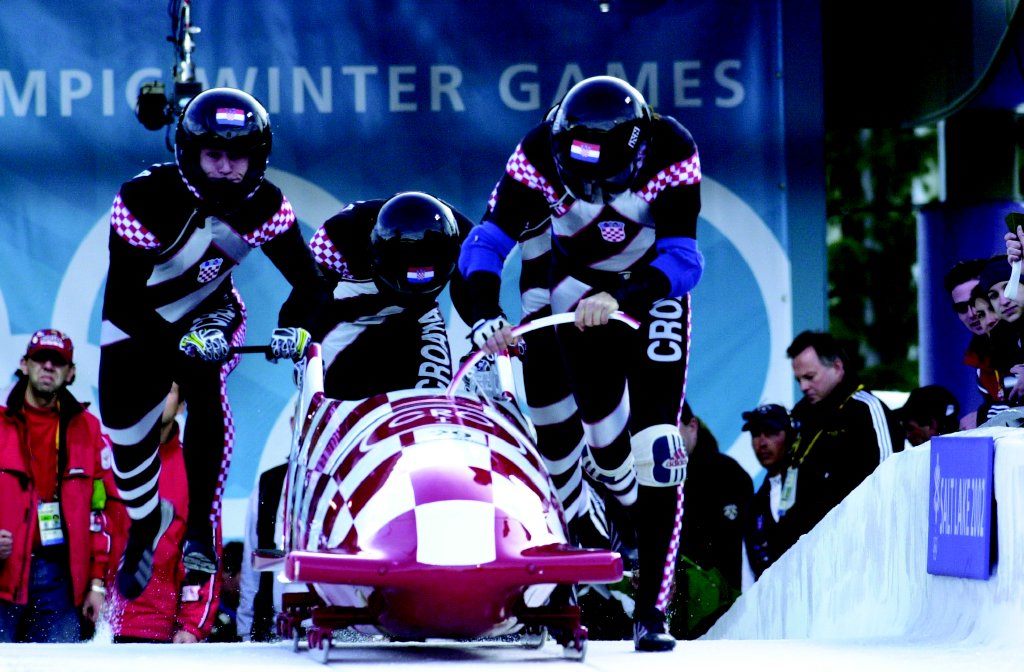
In late 2001, we missed a couple of points to qualify, and there was only one more event to qualify, in Lake Placid, and that bobsled track is infamous for being pretty dangerous - the devil’s highway, they call it. We knew that we would get enough points just to finish the race in the top 20 teams, which we did. However, in the third run, I remember we were literally just a few millimeters from flipping over. If we tilted just a little bit more, we would be disqualified.
We finished the raced, even finished in the top ten, and got enough points to qualify for the Winter Olympics in Salt Lake City in February 2002. We competed there and it was a lot of fun. It was completely different than being at the Summer Olympic Games. What I liked was that there was no pressure. At the Summer Olympic Games, there is always pressure to win a medal. You also have to get up early and practice, but in Salt Lake City, we didn’t have to get up early - and we would practice at 7 pm. We could have some fun and finally enjoy the Olympic Village. We saw Janica Kostelic win all her medals. It was a very unique experience overall. In the end, we also finished well - 26th out of 34th bobsleds. It was pretty good. This was also the first time that the Croatian bobsled team was at the Olympic Games.
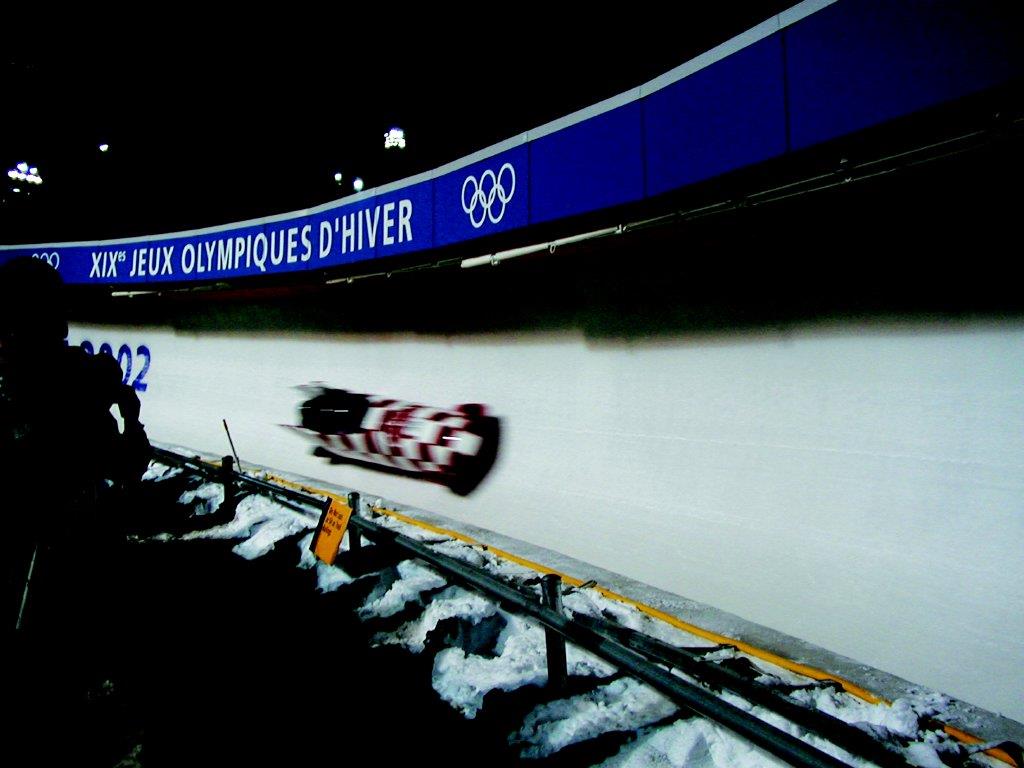
In 2004, after everyone knew about our bobsled story, the European Broadcasting Union announced a project and every country had to make a 10-15 minute short movie with actors. Elvis Bosnjak played me, and Vedran Mlikota played my partner. We had a bobsled here on the Riva, on wheels, where they were jumping in and out. The movie was called I Galebovi su se smijali (Even the seagulls had some laughs).”
Igor retired from international sport in 2004.
“The Olympics in Athens was supposed to be my last. I got elected as a member of the City Parliament in 2005 as a member of the city corporation in charge of sports, so I was in politics for two years, but I didn’t really like it. I came back to rowing in 2007. I wanted to try to qualify for Beijing, but in Beijing, I would be 38, and I would definitely be the oldest. None of the guys were left from my generation……… We went to the last qualification regatta, and this time it wasn’t in Lucerne, my lucky course, but in Poznan in Poland in June 2008. We were not quite fast enough. With 2004 standards, we had about the same time, but every four years, the standards get higher, and it wasn’t enough to qualify. We finished 5th, and we needed to be 1st or 2nd to qualify. That was technically my last international competition, in 2008.
Then I competed just two more years for my club, Gusar Split, until 2010, when I was 40 and I won the last gold medal in my career at the senior level. I am now winning medals in the masters' events. That’s the whole rowing story.”
But is it?
“Haha, I will probably be competing again this year in a senior competition. I would like to try to win another gold medal. I don’t think anyone that was 50 ever won a gold medal in a senior rowing event. This championship is in Zagreb in April.”
So, how does Igor Boraska spend his time today?
“I am a member of the Croatian Olympic Committee Assembly and president of the International Relations Committee. I was the president of the board and I was also the president of the Spit Sports Association for four years, between 2012-2016. I might run for president again this year. After the Olympics, people in Split sports want me to run again. We will see, sport is my life.
In the meantime, I have been competing in a different type of rowing - or coastal rowing. It’s different; it’s not like the Olympic type of rowing where you have a straight line for 2,000 meters. In coastal rowing, it is more like sailing. You are out on the open sea, and the boats are sturdier. You have turns and big wakes, and winds coming from all sides. Even if you’re not in top shape (in terms of highest Olympic rowing standards), you still can win or be among the top ten in the world, which we managed a couple of times between 2012 and 2020. I like to row in the sea.
Last year we had the championships in Hong Kong in November. The wakes were coming from all sides because it is the busiest port in the world. We didn’t make it to the final but were still pretty decent. The year before in Vancouver, we were in the A final, and before that, in Monaco and Lima, Peru, we were it the A final both years.”
But a true testament to the fact that Igor can do it all is confirmed by his participation in the New York Marathon at 47. It was his first marathon ever, and he finished with a final time of 3:57:48. The London Marathon is next on the horizon.
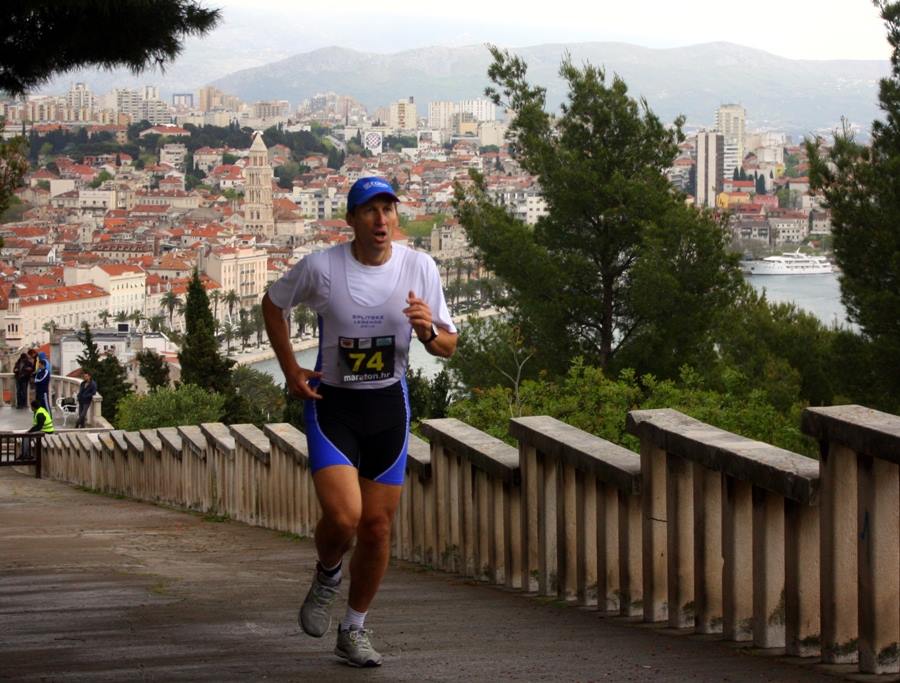
The future of Croatian rowing is bright.
“We have great human potential here. Unfortunately, we don’t have great seniors in my club at the moment, but we have two guys who won 4th place at the junior championships last year in Tokyo. Their names are Karlo Borkovic and Ivan Vukovic. They are really good at their age. If they continue to progress, I believe that in a couple of years, maybe even for the Olympics in Paris in 2024, they will be able to compete and qualify. Rowing is a tough sport, and right now, the center of rowing, which was mostly in Split, has moved to Zagreb because of the Sinkovic brothers and Damir Martin. Zagreb also has the best conditions to train at Jarun Lake.
But the winter training is best done on water near Skradin and Šibenik or Peruca Lake in Inland Dalmatia during the summer. We have everything that is needed here in Croatia.
I think Sinkovic brothers will definitely win a medal in Tokyo Olympic Games, and I hope for gold again, but you never know. It’ll be very hot and humid in Japan in late July. Damir Martin had lots of health issues with his hip and had surgery. He just got back in the boat a month ago. He is very dedicated. I wouldn’t say he is a favorite to win a medal now, but who knows. It’ll be a great result even if he makes the final - the top 6, considering his health problems.
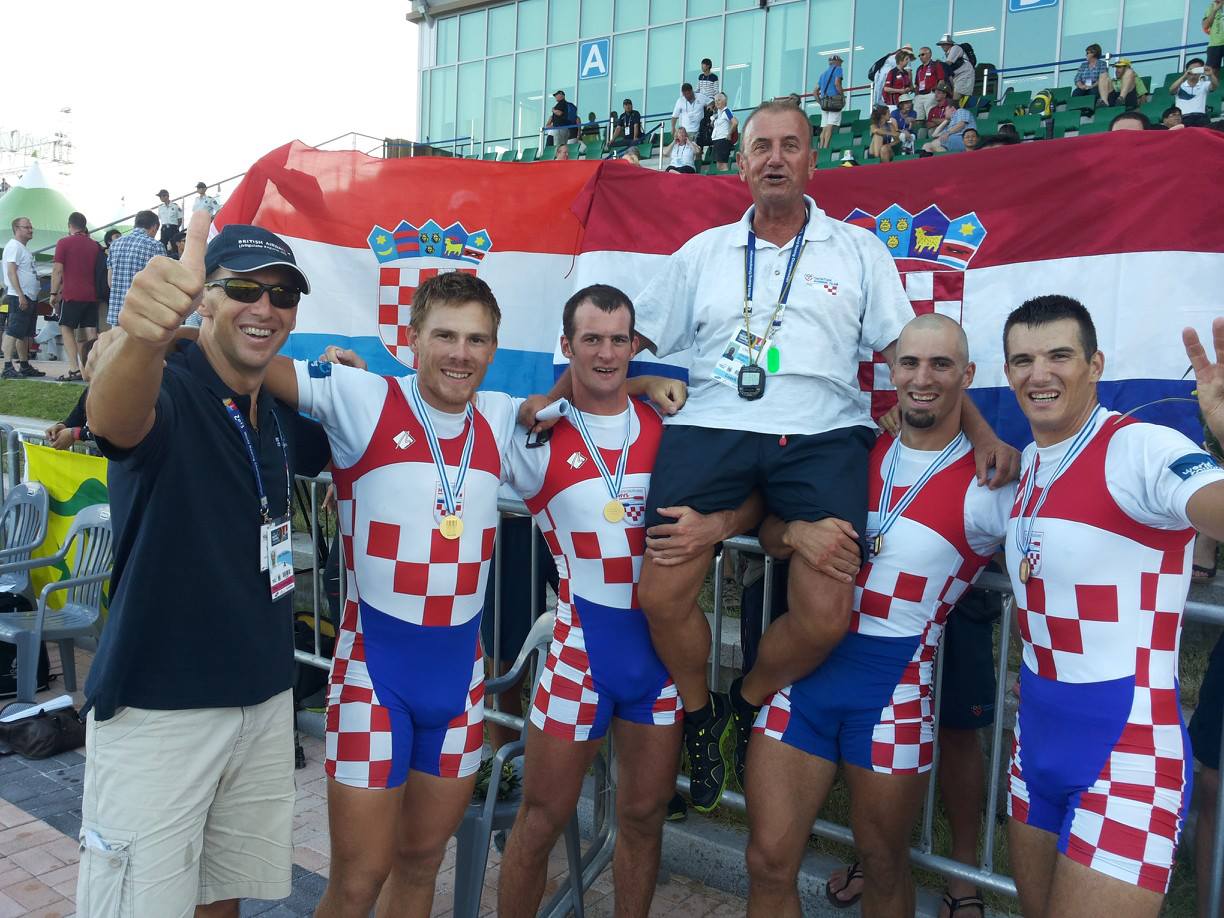
We will have these three guys, the same three that won the gold and silver in Rio. There is also one young team, either a four or a double scull, who might even qualify. They have the last qualification regatta at the beginning of June, so we will see if we get another qualification spot in the double scull. There is also a women’s team in the double scull, the Jurkovic sisters from Korcula, and another pair from Zagreb. It would be great if we had a women’s team. It’s only been men so far to compete for Croatia in rowing at the Olympics, though we have had a couple of girls come close.
Rowing in Croatia, in general, has massive potential. Coastal rowing is also gaining popularity. It is very popular in Mediterranean countries but not in Croatia yet. In France, Italy, Spain - there are more clubs in coastal rowing than in rowing. Anyone can take part in coastal rowing. Someone who has never rowed before can do it because the boats are much sturdier and wider. It’s easier - even older people who used to row earlier in their lives can do it. It’s also great for tours. I have talked with a lot of Italian rowers who would like to arrive in Zadar and then go on a rowing tour through Kornati and to Split, but we don’t have those boats yet. There are only a few in Croatia - and in Split we don’t have any.
Top athletes and recreationalists can both use this type of rowing. What’s even better is that one of the events will become an Olympic event in 2024. It’ll be the mixed double scull. It will be the first rowing event to be mixed.”
Igor will be at the Tokyo Olympics this summer, too, but this time as a commentator.
“Yes, I will be there, co-commentating for Croatian Radio Television. That’s the plan for this year, at least.”
To read more about sport in Croatia, follow TCN's dedicated page.
Best Athletes in Split Awarded at Museum of Croatian Archaeological Monuments
March 6, 2020 - At the Museum of Croatian Archaeological Monuments, the Split Sports Federation officially proclaimed the winners of the Annual Award, this time for 2019, which is a long-standing tradition of this umbrella sports association in the city of Split.
Dalmacija Danas reports that in the presence of many people from the sports, cultural and social milieu of Split, the ceremony was opened by Neno Periš, President of the SSŠ, Mate Omazić, Mayor for Social Affairs of the City of Split and Envoy of Mayor Andro Krstulović-Opara and President of the City Council, Igor Stanišić.
It was followed by a song by Klapa Šufit and soprano Ivana Bosančić Lasić, accompanied by Zoran Velić on piano.
The selection of all the winners was made by the Executive Board of SSŠ at the proposal of the Awards Committee.
In the competition of eight nominated female athletes, Klara Kovač of the Taekwondo Club Marjan was selected as the Most Promising Female Split Athlete for 2019, after winning 2nd place at the European Championship for the younger seniors up to 21 years in the 53 kg category. In addition to the award, Klara received a laptop as a donation from the Faculty of Kinesiology in Split.
The most promising male Split athlete for 2019 was Franko Grgić from the Jadran Swimming Club, in the competition of five nominated athletes. Franko Grgić won 2 gold medals in the 1500 and 800 m freestyle at the World Junior Championships. He set the world junior record in 1500m freestyle. At the European Youth Olympic Games (EYOF) he won 2 gold medals in the 1500m and 400m freestyle. He sailed 2 Olympic standards for the Tokyo 2020 Olympic Games (1500 and 800 m freestyle). He placed 2nd in the selection for the International Piotr Nurowski Award for Best Young European Athlete in 2019 in the selection of the European Olympic Committees. He won 2 Drazen Petrovic awards from the Croatian Olympic Committee: for the greatest hope of Croatian sport and for the most successful young athlete in 2019. Franko Grgić also received a laptop as a gift from the Faculty of Kinesiology in Split.
In the competition of four nominated teams for the best Split women's team for 2019, the Split Women's Football Club was selected, who won the championship and the Croatian Cup.
For the best Split men's team for 2019, the Executive Board decided to select two teams out of four nominees. For the third time in a row, the Mertojak Bowling Club was selected as the best men's team, after winning the Europa Cup for the second consecutive time and reaching the quarter-finals of the Champions League (and again this year in the continuation of the competition and in the semi-finals, scheduled for March 28 in Apatin). They won the Croatian Cup and the 2nd place in the Croatian Championship. In addition to Mertojak, the water polo club Jadran, who placed 3rd place in the Croatian Championship and was the semi finalist of the Croatian Cup, was named the best men's team. They also placed 11th in the Champions League group stage.
For the best coach of the women's and men's categories in the competition of 10 (female) and 9 (male) nominated candidates, Toni Tomas, coach of Taekwondo Club Marjan, was named the winter.
The Executive Board of the Split Sports Association of Disabled Athletes selected Anđela Mužinić as the best female athlete, who is a member of the NEC Split table tennis club, which won 3rd place individually and was the 1st place team at the European Table Tennis Championship, while Dino Sinovčić was selected as the best male athlete and is a member of the Cipal Swimming Club. Dino won 1st place in the 100m backstroke.
At the end of this remarkable sporting event, the best athlete and athlete of the City of Split was declared for 2019.
In the competition of 11 nominated athletes, Matea Jelic of the Taekwondo Club Marjan was named the best female, after qualifying for the Olympic Games in Tokyo 2020. She won 3rd place in the European Championship in the category up to 67 kg and won 1st place in the final in China. She finished the year in 3rd place in the Olympic rankings and in 2nd place in the world rankings.
The best male comes from Marjan Taekwondo Club - Toni Kanaet. Toni qualified for the Tokyo Olympics in 2020. He won 2nd place in the European Championship in the 80 kg category. Only six of the top 2074 athletes in that category were placed in the Olympic Games category.
To read more about sport in Croatia, follow TCN's dedicated page.
Sutivan and Split to be Connected by Catamaran in Peak Season
March 5, 2020 - Welcoming news out of Sutivan on Brac island today as a catamaran line will connect the island town and Split in just 20 minutes this season.
Many have forgotten, and most do not know, that Sutivan was once directly connected to Split by a boat line whose number and type have changed over the years. But after the construction of the new ferry port in Supetar, Sutivan, as well as other coastal towns of Brac, has no direct connection with Split, with the exception of MB Mali Jure, which for several years tried to maintain a connection but ultimately gave up.
Thus, Dalmacija Danas reports that with the joint efforts of the Municipality of Sutivan, the Municipality of Milna and the company "Krilo Shipping Company", at its 54th session, the Coastal Shipping Agency, gave its consent for a daily commute between Milna - Sutivan - Split and vice versa every day from July 3, 2020, to August 30, 2020.
Passengers who board the catamaran in Sutivan will arrive in Split in 20 minutes, as will passengers from Split to Sutivan. It goes without saying that this will facilitate the lives of islanders or anyone looking to arrive and depart from Sutivan. Until now, passengers traveling without a car are connected via the slower and more expensive ferry service via Supetar.
So, how much will the catamaran line set you back? A one-way ticket will cost only 30,00 kn, for islanders 14,00 kn while for pensioners the ticket is completely free of charge.
This is huge news for the Municipality of Sutivan and news that we think will be welcome by most of us along the Dalmatian Coast. The first season will determine whether this line has the potential to extend the period of its operations in the future, the Municipality of Sutivan said.
For now, we can all look forward to the return of this catamaran line, connecting Milna - Sutivan - Split from July 3, 2020, to August 30, 2020.
To read more about travel in Croatia, follow TCN’s dedicated page.
HNL Round 25 Recap: Dinamo Tops Hajduk in Eternal Derby at Poljud
March 5, 2020 - The 25th round of the Croatian First League was played mid-week, from March 3-4, 2020. This round featured the always exciting ‘Eternal Derby’ between Hajduk and Dinamo at Poljud Stadium in Split.
Lokomotiva v. Slaven Belupo (3:0)
Lokomotiva and Belupo opened the 25th round on Tuesday, March 3, 2020, in Zagreb in front of 706 fans.
While the first half went without goals, Uzuni scored at the start of the second half in the 59th minute for 1:0. An own goal by Jeffren made it 2:0 two minutes later, and Budimir sealed the victory for Lokomotiva with a penalty in the third minute of injury time for 3:0.
Lokomotiva is currently in 4th place with 43 points, while Belupo is in 7th with 23.
Rijeka v. Inter Zapresic (4:1)
Rijeka and Inter met on Tuesday, March 3, 2020, at Rujevica Stadium in front of 3,376 fans.
Colak scored the first goal for Rijeka early on in the 9th minute for the 1:0 Rijeka lead. Lepinjica increased Rijeka’s lead in the 41st minute for 2:0 at the half. Galovic made it 3:0 in the 66th minute, while Mamut gave Inter one goal in the 70th minute for 3:1.
Muric scored in the 84th minute for the final score of 4:1.
Rijeka is currently in 3rd place with 44 points, while Inter is in 9th with 17.
Istra 1961 v. Osijek (1:0)
Istra and Osijek met in Pula on Wednesday, March 4, 2020, in front of 603 fans.
Delic scored the only goal of the game in the 2nd minute for 1:0 Istra.
Istra is currently in 8th place with 19 points, while Osijek is in 5th with 39.
Varazdin v. Gorica (2:2)
Varazdin and Gorica met on Wednesday, March 4, 2020, at NK Varteks Stadium in front of 1,411 fans.
An own goal by Canadjija made the game 1:0 for Varazdin in the 31st minute. Benko scored three minutes later to make it 2:0 at the half.
Lovric came back with a goal in the 65th minute for 2:1, and a penalty equalizer by him in the fourth minute of injury time made it 2:2, which was the final score of the game.
Varazdin is currently in 10th place with 17 points, while Gorica is in 6th place with 35.
Hajduk v. Dinamo (0:2)
Hajduk and Dinamo closed out the 25th round on Wednesday, March 4, 2020, in the 'Eternal Derby' at Poljud in front of 22,436 fans.
A red card in the 40th minute for Hajduk’s Ismajli completely changed the game, which was still 0:0 at the half. Dinamo took advantage of having a player more in the second half and Kadzior scored two minutes in for the 0:1 Dinamo lead. Ademi increased Dinamo’s lead to 0:2 in the 75th minute, which was the final score of the game.
Hajduk is currently in 2nd place with 45 points, while Dinamo is in first with 62.
You can see the full HNL table here.
To read more about sport in Croatia, follow TCN’s dedicated page.
LEN Champions League: Mladost, Jadran, Jug Record Wins in 10th Round
March 5, 2020 - Jadran Split, Jug Dubrovnik, and Mladost Zagreb featured in the LEN Champions League 10th round this week.
Mladost opened the LEN Champions League 10th round for Croatian clubs in Group B with a win against Waspo Hannover (18-12) on Tuesday and is one step closer to reaching the Final Eight.
Luka Bukic and Lovre Milos were the best for Mladost with four goals each, while Hanover was led by Aleksandar Radovic, also with four goals.
OSC Budapest leads Group B with 22 points, Ferencvaros and Pro Recco have 20 points each and a match less, while Mladost is fourth with 19 points.
These clubs are followed by Terrassa with 13 points, Marseille with 10, Waspo Hannover with six, and in the last place is Dinamo Tbilisi with three points.
In Group A, Jadran Split defeated Hungarian club Szolnoki 13-9 (3-1, 5-2, 2-4, 3-2) at Poljud on Tuesday
Jadran Split was led by Nathan Power with three goals, while Duje Pejkovic and Ivan Krapic scored two each. Radomir Drasovic was the best for Szolnoki with four goals.
The second representative in Group A, Jug Dubrovnik, beat Sintez Kazan 14-10 and at least temporarily takes the top spot in the standings.
Jug led from the first minute and never lost an advantage against the weakest team in the group.
Vjekoslav Kobescak’s team was up by four goals on several occasions, with the visitors having the greatest lead at the beginning of the last quarter when it was 10-5.
Jug was led by Loren Fatovic with five goals, while Javier Garcia and Hrvoje Benic scored two goals each. The most efficient for Sintez was Adel Latipov, Sergei Lisunov and Nikolai Lazarev with three goals each.
Jug leads Group A with 24 points, followed by Barceloneta with 22 points, who also has a game less, while Olympiacos is in third with 19 points and the match is less.
The 11th round of the LEN Champions League will be played from April 10-11.
To read more about sport in Croatia, follow TCN’s dedicated page.
ULTRA Europe Announces Seven New Artists Performing in Split this Summer
March 4, 2020 - The unique destination music festival ULTRA Europe has announced even more names to the 2020 lineup.
Even more electronic music stars will perform at the eighth edition of the ULTRA Europe music festival, to be held from July 10-12 at Park Mladezi in Split. On Tuesday, seven new names were revealed, joining many of the already announced performers.
Namely, Above & Beyond, Dash Berlin, Dillon Francis, Joseph Capriati, Krewella, Oliver Heldens and Nicky Romero are the next batch of stars who will perform live in Split in front of tens of thousands of their fans from around the world, on one of the two biggest festival stages, according to organizers. Festivalgoers won’t have to wait long for another lineup announcement, either.
Above & Beyond is an English electronic trio made up of Paavo Siljamaki, Jono Grant and Tony McGuinness. Their 17 successful years include the revolutionary radio show Group Therapy, tours of the world's most famous clubs and festivals, numerous primal dance anthems, and their own label featuring a catalog of excellent musicians. In less than a month, they are embarking on a major Acoustic III Tour, and even Croatian fans won't have to wait long to see them live. The performance in Split will be as original as ever.
The name Dash Berlin nearly says it all. This award-winning Dutchman has outstanding skills in leading his audience on an energetic musical journey. He says his success is due to the love of his fans who have always supported him and remained faithful to him throughout his career, and is recognized for his emotional and energetic quality dance music, which he loves to bring to the stage.
Another big Dutch star, Oliver Heldens, became one of the most sought-after DJs of today, and with his hit 'Turn Me On', he didn't get off the top of the dance charts. He has just completed a major tour of America, and his warm-up release for summer shows is his newly released single 'Take A Chance'. The ULTRA music family will be joined by successful Dutch musician Nicky Romero this summer, who recently dropped a new single called 'Falling', which brings his listeners back to the golden age of the electro house movement, but at a much faster pace. Vini Vici is an Israeli duo whose sound can be described as psytrance. The collaboration began in 2013 and is well known to the audience of ULTRA Europe.
Dillon Francis is an American DJ and producer known for being one of the pioneers of moombahton and moombachcore style. He is currently preparing for the start of the big Sugar, Spice & Everything tour, and will return to the ULTRA stage after a full four-year hiatus. Krewella is another name from America, made up of sisters Jahan and Yasmine Yousaf, who live in Los Angeles who have grown into true symbols of female power. Their rebellious fashion and attitude have encouraged millions of fans to embrace them, and their performances are considered one of the unique musical performances in the world.
Due to its cult status, and to the demand of a large number of fans, the Resistance dance arena is set to hit the biggest release this year, with Joseph Capriati joining the already announced Adam Beyer, Anna, Charlotte De Witte, Mace Plex and Marc Carola. This young Italian DJ and producer is recognized for his emotional techno sound, performed with special precision, charm and infectious energy that has become one of the hallmarks of the global club and festival scene.
You can find more information about Ultra Europe here.
Source: Dalmatinski Portal
To read more about lifestyle in Croatia, follow TCN’s dedicated page.
Chops Grill Says Goodbye to Winter, Hello to Spring by Returning with New Chopsylicious Menu
March 3, 2020 - Chops Grill reopens on Tuesday, March 3!
After a short winter break (which felt like an eternity), Chops Grill is back from their hibernation and ready to rumble with a brand new Chopsylicious menu just in time for the spring season.
If you’re a newcomer to the wonderful world of Chops Grill, listen carefully…
Chopsylicious is a tried and true, three-course mix-and-match menu of the restaurant’s classics, with the total price reflected in the main course you choose.
So, what’s on offer this time around?
From Tuesday, March 3, 2020, restaurant-goers can choose from a starters selection of Vichyssoise soup of leek and potato, tuna belly carpaccio with shallots and a rocket salad with pomegranate and citrus, the crispy panzanella salad with skuta cheese and whole grain mustard dressing, or steak tartar.
For main courses, it’ll be hard to choose between the beetroot risotto or seafood spaghetti with squid ink sauce and local wild herbs, and that’s without mentioning the list of meat dishes on the menu.
For instance, the supreme chicken is served with seasonal vegetables and potato puree, while the beef, vegetable and plum skewers are accompanied by potato wedges. The grilled rump steak is filled with bacon and cheese, the beef wellington is wrapped in mushroom, onion, foie gras sauce and fresh black truffle, while you can never go wrong with the classic T-bone steak.
Because no meal is complete without dessert, Chops has pulled out all of the stops this spring, offering guests the fruits of forest crème brûlée, semifreddo, chocolate brownie with vanilla ice cream or the traditional rožata (egg flan) with lavender, rose, and Chantilly cream.
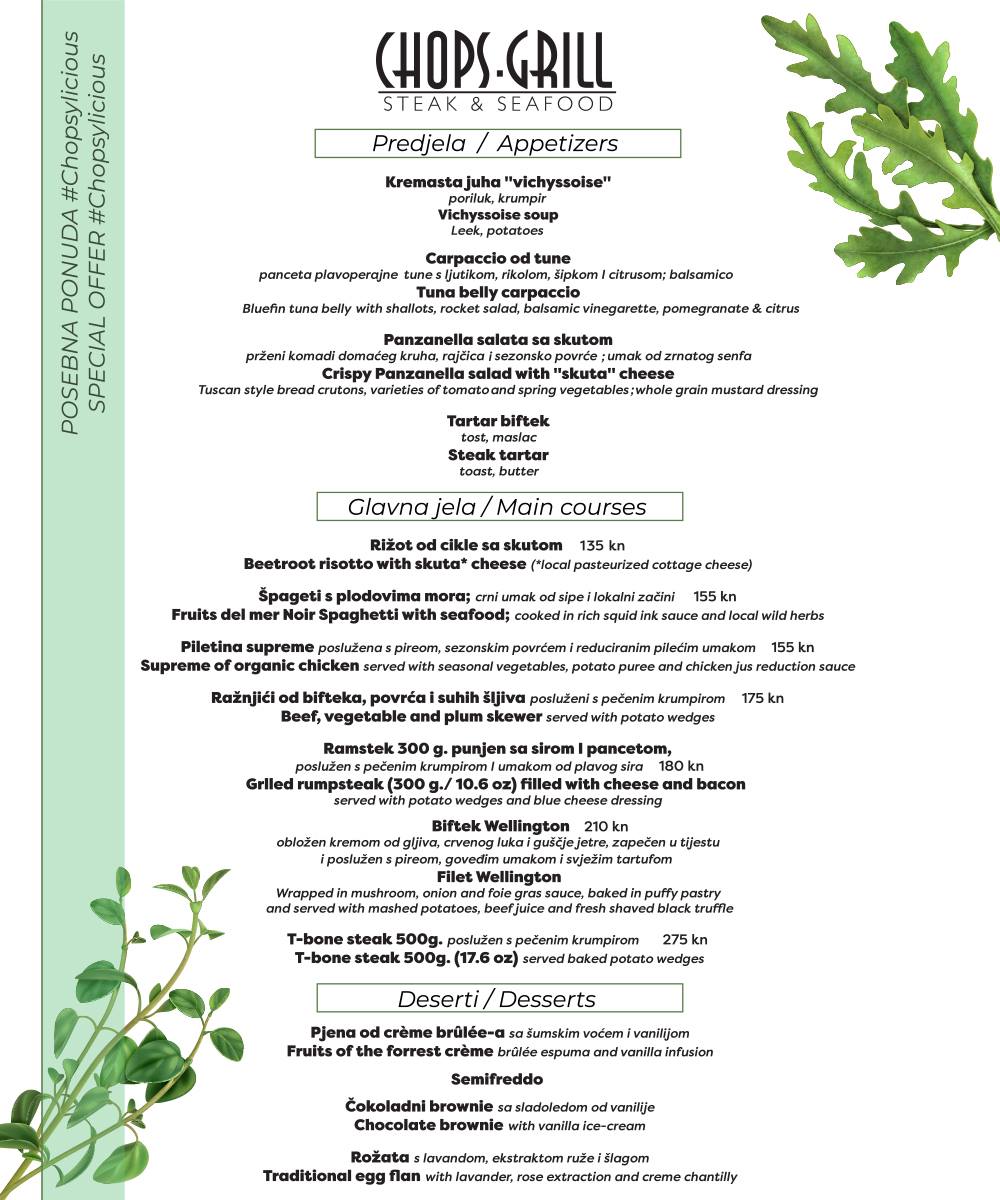
Chops Grill is now open every day from 12 pm to 10:30 pm.
For reservations and more info, email This email address is being protected from spambots. You need JavaScript enabled to view it., visit their Facebook page, or call +385 91 365 0000. You can also visit their website here.
To read more about lifestyle in Croatia, follow TCN’s dedicated page.
Break Time Fans, Rejoice! Both Split Locations Have Officially Re-Opened
March 2, 20202 - March has begun with a bang for Break Time nautical jewelry in Split as both locations in the Dalmatian capital are now back in business for the busy season ahead.
The month couldn’t begin with better news for Break Time fans with the announcement that the flagship Zadarska 1 location and the Trogirska 8 atelier and outlet store have reopened for a new season!
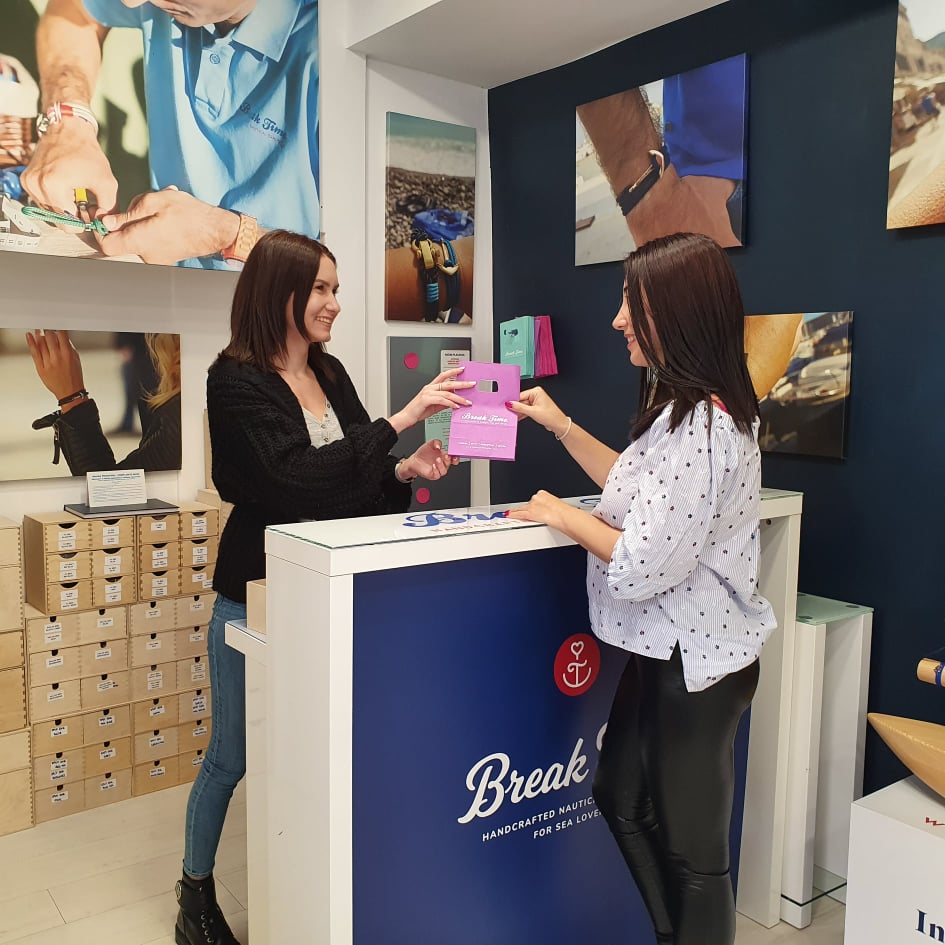
In bona fide Break Time fashion, the first customers at both shops received surprise gifts, while all customers enjoyed a 10% discount. Break Time's first lucky customer of 2020 at the Trogirska location received all of his items for free!
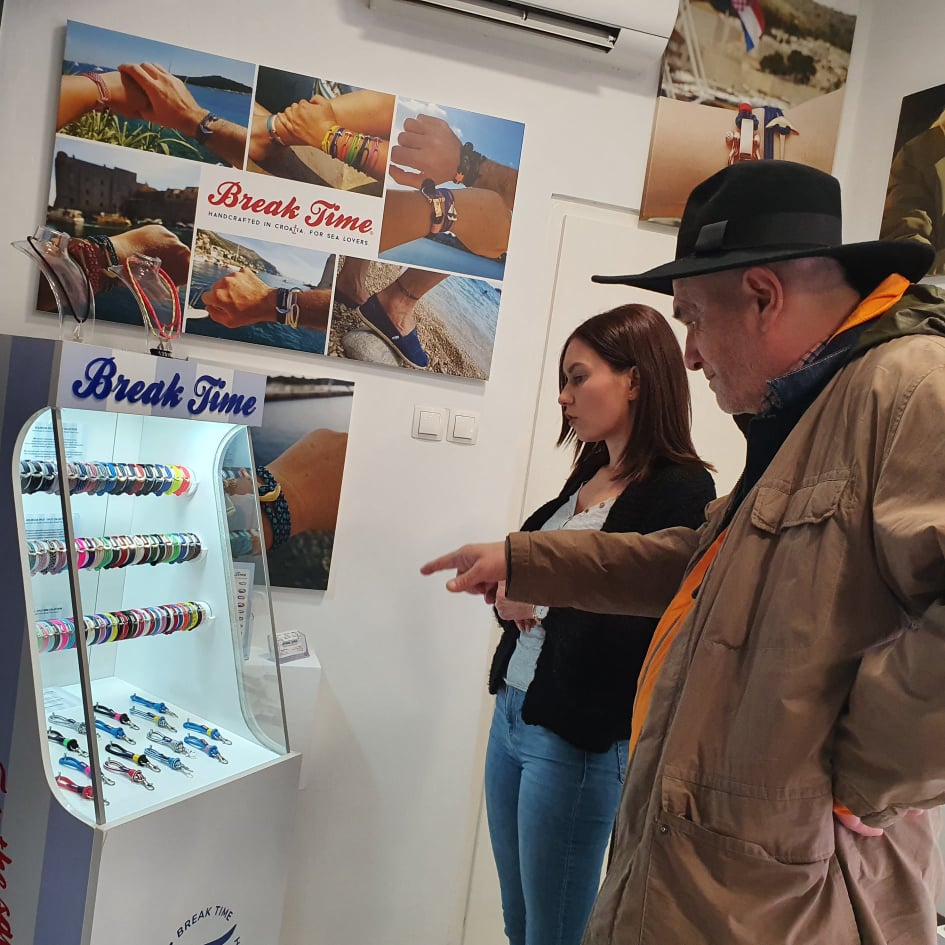
But that’s not all the good news...
“The absolute novelty is that the Trogirska 8 will now be the Break Time outlet store (where you can buy the last pieces remaining from our 2015-2018 collections, as well as the new collections), and on the upper floor we will have the Break Time atelier - so you will be able to order any custom bracelet or custom engraving ON THE SPOT (in either Zadarska 1 or Trogirska 8 locations) and our designer, Leonard Copoiu, will make it for you in his new atelier (and you can even watch him do his magic).”
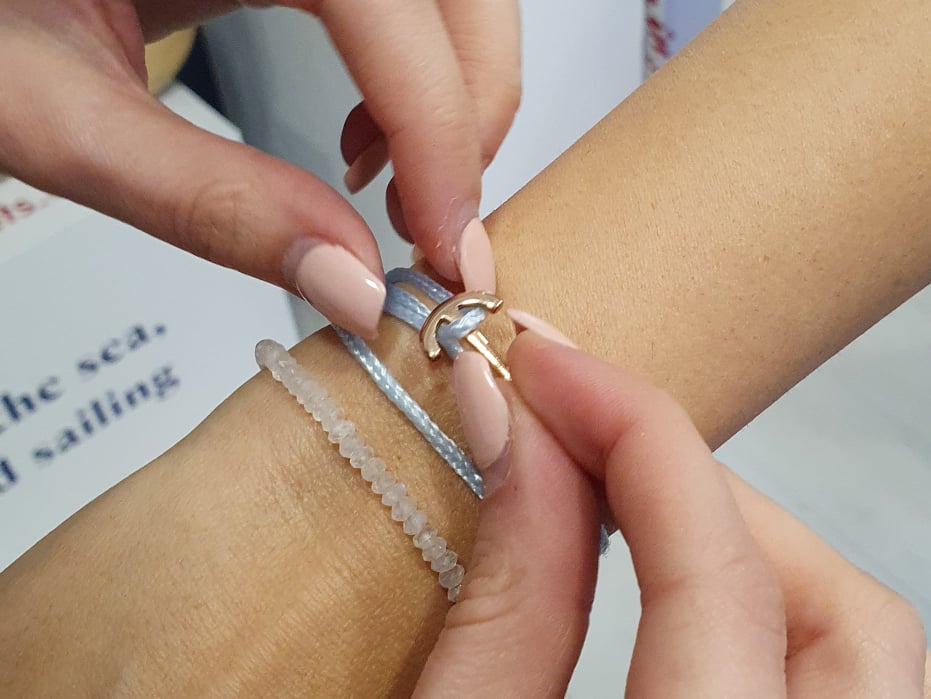
The Zadarska 1 location will work in March from Monday to Sunday, from 10 am to 6 pm, and from April 1, daily summer hours will be in effect, from 10 am to 10 pm.
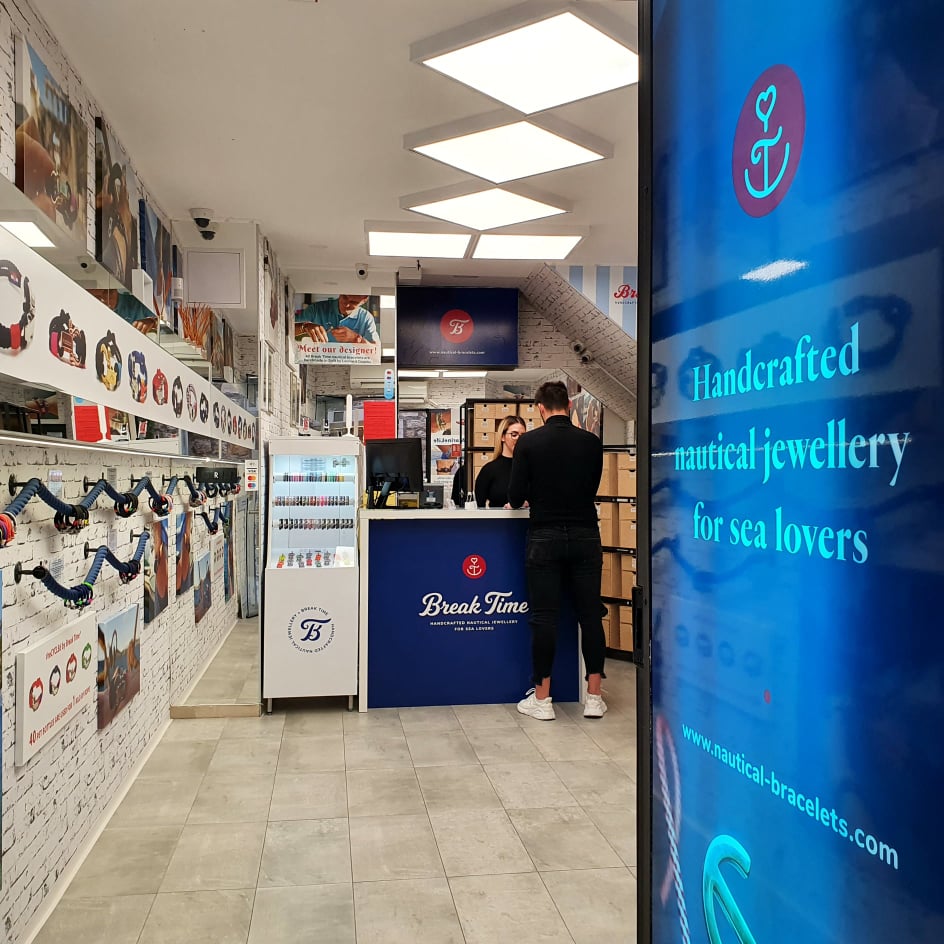
The Trogirska 8 location, right next door to the original Break Time shop you all know and love, is open this month from Monday to Friday,10 am to 6 pm.
Don’t forget that Break Time also started the year by officially launching a franchise for all of their fans.
“It took us five years to perfect our handcrafted nautical jewelry, to deliver great customer experiences, to gather enough retail-running knowledge, to make enough mistakes and learn from them.
We are now ready to share our brand to the world, so say hello to the Break Time Franchise!” said owners Mirela Rus and Leonard Copoiu upon announcing the big news.
So, if you’re looking for a new business opportunity that:
- Is easy to run, even if you have little experience in retail
- Has proven business results and brings waves of success - fast
- Belongs to an attractive, niche market
- Sells unique products that have taken the market by the storm
...then choose one of the available dates/times, fill in the questionnaire as accurately and in detail as you can, and get a FREE DISCOVERY CALL with the Break Time brand owners, Mirela Rus and Leonard Copoiu, to help you decide if this business is right for you.
To make sure you never miss a Break Time beat, follow them on Facebook, Instagram, Twitter, and YouTube, and check out the new Break Time website here.
To read more about lifestyle in Croatia, follow TCN's dedicated page.
Split GAST Fair Welcomed Record 25,000 Visitors, 800 Brands and Exhibitors from 8 Countries
March 2, 2020 - The Split Gast Fair was held from February 26 to 29, 2020, with a record number of visitors registered for the Jubilee 25th edition.
Dalmatinski Portal reports that the Jubilee, 25th Split GAST Fair, which brought together almost 800 brands, exhibitors and co-exhibitors from eight countries, surpassed last year by all economic and statistical indicators, and once again, by the quality of its exhibits and rich professional program, confirmed the status of the leading regional fair that brings together all the best of gastronomy, winemaking and tourism, as well as catering and tourism companies.
GAST 2020 was held at Split's Spaladium arena from February 26 to 29, 2020 and a record 25,000 visitors locally and abroad were recorded during all four fair days to experience the professional and entertaining program dedicated to the 25th birthday. At the same time, the fair offered innumerable business opportunities, a large number of jobs completed, 12 professional programs and workshops, as well as numerous tastings and presentations. All this, as well as the interest in the professional fair program and the many accompanying events within the GAST 2020 show, in support of another successful upcoming tourist season.
The offer of white and red wines, as well as spirits, was extremely rich and high quality, and within the educational program, five different wine workshops were held to popularize autochthonous, Croatian wine varieties.
GAST was sponsored by the Ministry of Regional Development and EU Funds, Ministry of Tourism, Ministry of Agriculture, Ministry of Economy, Entrepreneurship and Crafts, Croatian Chamber of Commerce, Split-Dalmatia County, City of Split, Split-Dalmatia County Tourist Board and Split Tourist Board.
The general sponsors of GAST 2020 were Rotodinamic, Premis, Samsara and Petason. Virovitica-Podravina County was a partner county, and Čistoća Split an ecological partner.
You can see the photo gallery of the event here.
To read more about lifestyle in Croatia, follow TCN's dedicated page.
Split Diver Boris Milosic After Guinness World Record for Walking Underwater
February 29, 2020 - Boris Milosic is a 23-year member of the Split Diving Club. He was first in the public eye exactly a year ago, when he set a world record for diving in the Bi-Fin discipline in Serbia.
Dalmacija Danas writes that Boris Milosic will try to get into the Guinness Book of Records this weekend. This incredibly positive young diver is set to break the world record for walking underwater. The walk will be performed at the Marina pool in Kastela, around 5 pm on Sunday.
“The rule is that the body must be completely underwater and you must walk in the pool for as long as possible. One foot always has to touch the floor, and when walking, I have to watch the buoyancy of the body. Currently, the record is 79 meters, and I intend to become the first person to walk 100 meters underwater,” Boris Milosic said about making history on Sunday.
“Breathing is a mentally demanding sport. This is a pretty difficult discipline. There are dynamic disciplines where you are moving and static disciplines where you are not. This is something in between,” Boris added.
He will try to complete the venture in less than four minutes.
“I don't think a person who is not into diving can cross half a pool. I'll try to make it in less than four minutes, and if I enjoy it too much, it might be over four minutes - it will be ambitious for us.”
His love of diving was born during the school holidays.
“I was born and raised in Austria. My parents had a weekend house in Rogoznica where we spent the holidays. When I was a kid, I was afraid of the depth, until my dad threw me overboard, hahaa. I learned to swim and realized what I had missed. I have fallen in love with the sea and since then, every summer and sometimes in the winter I dive, even without a suit. Now I get crazy on land, while others are uncomfortable at sea,” Boris says about diving.
Diving requires great mental strength.
“It doesn't take me much time, maybe an hour and a half. It is very challenging for the nervous system and takes a long time to recover. In training, I have to think mentally non-stop, keep my focus on it, motivate myself every day because it is a difficult sport mentally. I try every year to get the best out of myself. I'm breaking new personal records; I'm just getting better and better. For the first time in the summer, I reached a depth of over 100 meters in the sea. I still have high goals for the future and that record is just the beginning of a more professional career,” Boris adds.
Boris is assisted by several sponsors and received a scholarship. He has one goal.
"I want to be the best of the best," Boris said ambitiously.
He regrets that diving is still not an Olympic sport.
“Our President Anna Arzhanova is working on this intensely and I have faith that we will soon be able to compete in the Olympic Games.”
He eventually said he was living his dream.
“It is nice to live in Croatia. While other people go to Austria, I came from there to Split. I had no one, I came only because of the sea and it was the best decision of my life,” Boris concluded.
To read more about lifestyle in Croatia, follow TCN's dedicated page.


